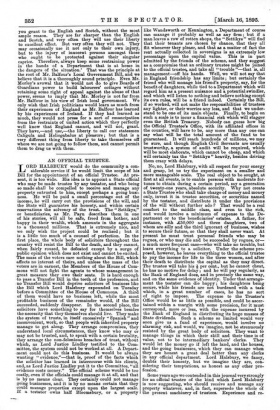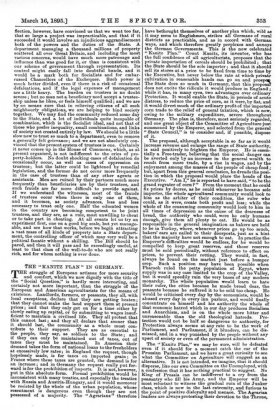Al OFFICIAL TRUSTEE. T, ORD H.A.LSBITRY would do the community a
con- siderable service if he would limit the scope of his Bill for the appointment of an official Trustee. At pre- sent, it is too wide. His idea is to appoint a State official who may be made trustee by any testator, and who being so made shall be compelled to receive and manage any property entrusted to him, except perhaps a going busi- ness. He will be paid a small percentage out of the income, he will carry out the provisions of the will, and the State will guarantee his honesty, and within certain reservations the solvency of the trust. The " Settikys," or beneficiaries, as Mr. Payn describes them in one of his stories, will all be safe, freed from bother, and happy in their wealth, which amounts in the aggregate to a thousand millions. That is extremely nice, and we only wish the project could be realised ; but it is a little too much of a counsel of perfection. In the first place, the whole body of solicitors throughout the country will resist the Bill to the death, and they cannot, when fairly roused, be defeated except by a surge of public opinion which does not exist and cannot be excited. The mass of the voters care nothing about the Bill, which affects no interest of theirs, and unless the mass of the voters are in earnest, the Members of the House of Com- mons will not fight the agents to whose management in great measure they owe their seats. It is hard enough to pass a Transfer Bill in the teeth of the profession, and no Transfer Bill would deprive solicitors of business like the Bill which Lord Halsbury expounded on Tuesday before a Committee of the House of Commons. A third of them would have no business left, while the most profitable business of the remainder would, if the Bill succeeded, suddenly disappear. In the second place, the solicitors have something to say for themselves besides the necessity that they themselves should live. They make the system of trusts, in itself excessively " Spanish " and inconvenient, work, so that people with inherited property manage to get along. They arrange compromises, they understand local circumstances, they know who may or may not be trusted, and, to speak with a certain brutality, they arrange the non-felonious breaches of trust, without which, as Lord Justice Lindley testified to the Com- mittee, the system could not be worked at all. A Depart- ment could not do this business. It would be always wanting "evidence,"—that is, proof of the facts which the solicitor has learned in intercourse with his clients, and, as Lord Justice Lindley put it to the Committee, "all evidence costs money." The official scheme would be too costly, even if the officials could manage it at all, and that is by no means clear. They certainly could not manage going businesses, and it is by no means certain that they could manage properties except upon the largest scale. If a testator owns half Bloomebury, or a property like Wandsworth or Kennington, a Department of course can manage it probably as well as any firm; but if a man leaves a row of rotten shops, the " Settikys" will find that their tenants are chosen by chance, that they all flit whenever they please, and that as a matter of fact the rent actually collected in sovereigns is an extremely low percentage upon the capital value. This is in part admitted by the friends of the scheme, and they suggest as a compromise that an ordinary trustee might be joined to the official trustee, and take all "trouble "—that is, all management—off his hands. Well, we will not say that in England friendship has any limits ; but certainly the friend who will manage his friend's property, say, for the benefit of daughters, while tied to a Department which will regard him as a present nuisance and a potential swindler, and which will listen to nothing and believe nothing except its own rules, will be a friend indeed. Certainly the Bill, if so worked, will not make the responsibilities of trustees any lighter, or their worries any less, and that we under. stand to be one of its main objects. Finally, to begin on such a scale is to incur a financial risk which will stagger even the British Treasury. Nobody can guess how big the Official Trustee's Office, with its affiliated offices in the counties, will have to be, any more than any one can say what will be the total amount of the fund to be guaranteed. It will reach hundreds of millions, we may be sure, and though English Civil Servants are usually trustworthy, a system of audit will be required, which will be most elaborate, which cannot be cheap, and which will certainly tax the " Settikys " heavily, besides driving them crazy with delays.
No, no, Lord Halsbury, with all respect for your energy and grasp, let us try the experiment on a smaller and more manageable scale. The real object to be sought, at first at all events, is to enable persons with moderate for- tunes to obtain during a certain period, say a generation of twenty-one years, absolute security. Why not create a State Trustee who shall take charge of money and. money only, invest it in trustee securities, or securities named by the testator, and distribute it under the provisions of the will without further ado ? That would be a real comfort to the middle class, and even to the rich, and would involve a minimum of expense to the De- partment or to the beneficiaries' estates. A father, for instance, with £50,000 and three daughters, two of whom are silly and the third ignorant of business, wishes to secure their future, so that they shall never want. At present he must trust personal friends who may be rogues, or who may die and be succeeded by rogues, or— a much more frequent case—who will take no trouble, but leave everything to a solicitor. Under the scheme pro- posed, however, he leaves everything to the official trustee to pay the income for life to the three women, and after their death to distribute the capital as they may direct. The trustee will take his per cent., but he cannot cheat, he has no motive for delay ; and he will pay regularly, as the Bank of England does, and in precisely the same way, and on the same evidence of identity. Under that arrange- ment the testator can die happy ; his daughters being secure, while his friends are not burdened with a task which, in a great number of cases, he has no sort of right to impose. The expense to the Trustee's Office would be as little as possible, and could be ascer- tained within a margin with some precision, for it must correspond, more or less, with the expense incurred by the Bank of England in distributing its huge masses of State dividends. Such a scheme so limited would very soon give us a fund of experience, would. involve no alarming risk, and would, we imagine, not be strenuously resisted by the great body of solicitors. They want to manage things in which their skill and their time is of value, not to be intermediary bankers' clerks. They would let the money go if left the land, and the houses, and the going businesses, which they can manage when they are honest a great deal better than any clerks in any official department. Lord Halsbury, we fancy, doubts their honesty, but we imagine they are, con- sidering their temptations, as honest as any other pro- fession.
Some years ago we contended in this journal very strongly for an official trustee of the kind which Lord Halsbury is now suggesting, who should receive and manage any property whatever, and, in fact, supersede the whole of the present machinery of trustees. Experience and re- flection, however, have convinced us that we went too far, that so large a project was impracticable, and that if it succeeded it would involve an injudicious aggrandisement both of the powers and the duties of the State. A department managing a thousand millions of property scattered all over Great Britain, and including the most various concerns, would have much more patronage and influence than was good for it, or than is consistent with our scheme of government through representation. Its control might easily fall into doubtful bands, and it would be a mark both for Socialists and for embar- rassed Chancellors of the Exchequer. Such power is much better divided, even if there is a risk of occasional defalcations, and if the legal expenses of management are a little heavy. The burden on trustees is no doubt severe ; but no man not a beneficiary need accept a trustee- ship unless he likes, or feels himself qualified; and we are by no means sure that in relieving citizens of all such neighbourly obligations, we are helping to bind society together. We may find the community reduced some day to the State, and a lot of individuals quite incapable of combination, which is the Socialist ideal, and not that of those who prefer inequality, small combinations, and links of society not created entirely by law. We should be a little slow now to trust so much to a department, even to remove a generally felt grievance ; and we are not absolutely con- vinced that the present system of trustees is one. Certainly it never comes up in the House of Commons, which, as at present organised, is not indifferent to the cries of pro- perty-holders. No doubt shocking cases of defalcation do occasionally occur, as well as cases of oppression on trustees ; but the latter could be lightened by remedial legislation, and the former do not occur more frequently in the case of trustees than of any other agents or assistants. Men are ruined by their partners much more frequently than beneficiaries are by their trustees, and such frauds are far more difficult to provide against. If we understand the witnesses, most of the frauds of trustees occur when there is only one of them, and it becomes, as society advances, less and less necessary to trust only one. Half the educated women in the country are becoming competent to be joint trustees, and they are, as a rule, most unwilling to cheat or to take part in cheating. At all events let us try an experiment first, one on a good big scale, but yet manage- able, and see how that works, before we begin attracting a vast mass of all kinds of property into a State depart- ment, the controlling officer of which may very well be a political fanatic without a shilling. The Bill should be pared, and then it will pass and be exceedingly useful, at least to that class of the well-to-do who are not really rich, and for whom nothing is ever done.



































 Previous page
Previous page